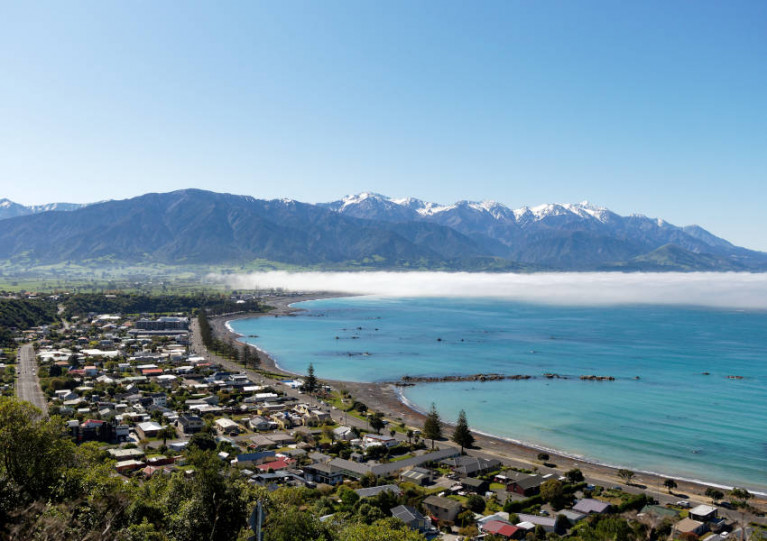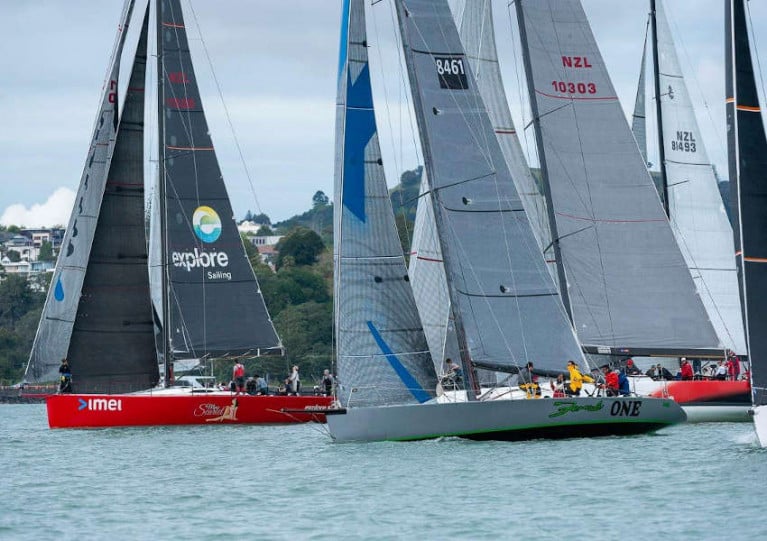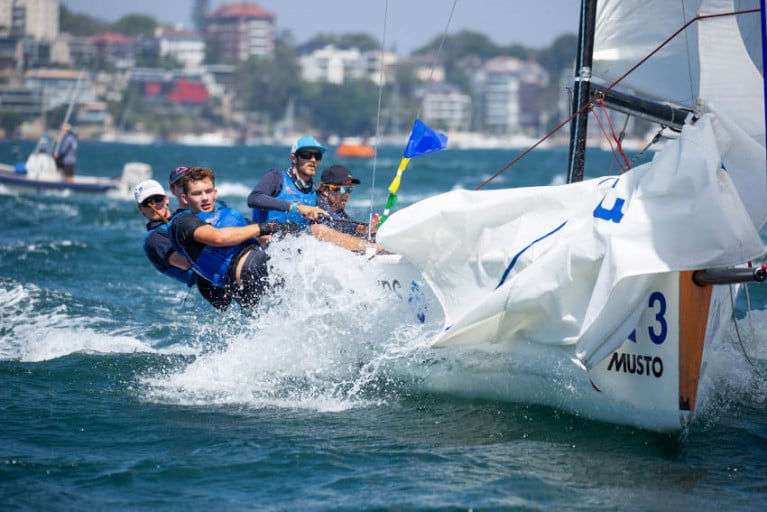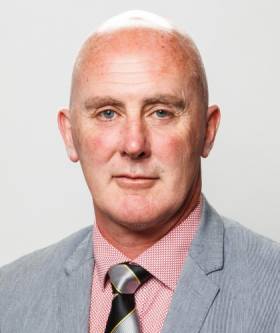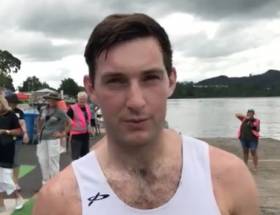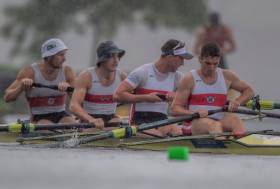Displaying items by tag: New Zealand
SailGP has been called out by Greenpeace’s executive director in New Zealand/Aotearoa over its response to a race cancellation prompted by the presence of dolphins on the racecourse.
Racing was postponed on Saturday 23 March at the second annual New Zealand Sail Grand Prix in Christchurch, leading to a so-called ‘Super Sunday’ where Australia’s SailGP team suffered a massive collision that forced their retirement.
Following the event, SailGP co-founder Sir Russell Coutts had harsh words for what he described as an “extreme marine mammal management plan forced upon us”.
But Greenpeace’s chief in New Zealand wasn’t having any of that.
In an opinion piece for the NZ Herald, Dr Russel Norman characterised Sir Russell’s comments as “a Trumpian outburst”, emphasising that SailGP was fully aware of the Lyttelton Harbour venue’s status as a protected area for endangered Upokohue/Hector’s dolphins.
“So much for all the greenwash that SailGP cares about the environment,” Dr Norman says.
The NZ Herald has more HERE.
New Zealand's marine industry is thriving, contributing $3 billion annually to the country's economy. The industry achieved $2.2 billion in local sales and $800 million in exports, according to new statistics released at the NZ Marine Industry conference by Executive Director Peter Busfield.
The conference, held in Tauranga, saw more than 130 people from New Zealand and Australia's marine industry come together for two days of presentations, panel discussions, networking, and brainstorming. Attendees brought with them innovative ideas, and the conference vibe demonstrated the New Zealand marine industry is in good health and is facing an exciting future.
President Garry Lock, who opened the conference, said it was great to finally have so many of the industry gathered in one place to celebrate successes and look into the future. "Although we have remained a tight group throughout all the disruptions of the past few years, it was fantastic to finally be back together in one place, talking about all aspects of our industry," Lock said.
Keynote speakers at the event included Darren Vaux, president of the International Council of Marine Industry Associations, and Andrew Fielding, president of Australia's Boating Industry Association, who shared valuable insights from a global perspective. There was also great interest in a panel session by representatives of marine companies active in the alternative power-source field, such as hydrogen and electric power, and new exciting boating forms such as foiling.
The conference also saw the presentation of NZ Marine's international and local events and promotions planned for the next 12 months, ensuring export and local sales growth opportunities for New Zealand manufacturers.
The marine industry is also facing technological changes in manufacturing processes, which will mean its 100%-owned Marine and Specialised Technology Academy training arm (MAST Academy) will continue to provide state-of-the-art industry-led apprenticeship training, providing good career pathways for school leavers and older learners alike.
The new generation of boaties want quick and easy access to go boating, cleaner power sources, and sustainable build materials in the boats they are using. They are also interested in maximising technology to achieve those goals.
The marine industry's growth is expected to continue, with more than 5500 boats expected to be built this year. The vast majority of these boats are trailer boats between 3.5 and 8m. The number of apprentices in boatbuilding and related trades has also reached 650.
"These are exciting times, and no doubt some major developments lie ahead," said Busfield. "One thing that hasn't changed, though, is how much Kiwis value their boating healthy lifestyle — 1.9 million people are regularly out on the water making boating New Zealand's most popular recreational activity. Our industry is in good heart, and we're ready to push ahead into the future and build on our tradition of innovation and success."
Public Competition Government Considers to Name Patrol Cutters On Way from New Zealand
The Government is considering carrying out a public naming competition for two inshore patrol cutters that the State has acquired from New Zealand. The pair of 'Lake' class cutters were originally commissioned for the Royal New Zealand Navy in 2009.
Simon Coveney, the Minister of Defence has proposed the innovative idea, however there will be safeguards implemented to prevent a recurrence of what took place in the UK of the 'Boaty McBoatface' debacle when the outcome of a public online vote turned farcical, however the research vessel was officially named the RRS Sir David Attenborough
The new patrol cutters will be introduced into the Naval Service where the majority of the fleet reflects the names of famous male Irish writers, they are the L.E.Samuel Beckett, James Joyce and George Bernard Shaw. In addition the third of the OPV90 class L.E. William Butler Yeats, Afloat adds is similarly named to that of Irish Ferries cruiseferry, the W.B. Yeats.
The Independent.ie which has more on the story, reports that Mr Coveney is believed to favour that at least one of the warships be named after a woman. This would enable the public to be offered a slate of options – from Maria Edgeworth, Lady Gregory, Katharine Tynan or Peig Sayers.
As for male writers they could include such legendary figures as Bram Stoker, Seamus Heaney, Austin Clarke and Padraic Colum.
As previously reported on Afloat.ie, the Irish Government has announced the purchase of two naval vessels from New Zealand.
The two inshore patrol vessels — formerly the HMNZS Rotoiti and HMNZS Pukaki — will bolster Ireland’s maritime security as the Naval Service continues its recruitment drive.
Announcing the deal today, Sunday 13 March, Foreign Affairs and Defence Minister Simon Coveney said the purchase is part of plans to address “ongoing challenges” and regenerate the Naval Service.
“The investment of some €26 million in these two inshore patrol vessels will provide replacements for LÉ Orla and LÉ Ciara,” he added.
“These inshore patrol vessels have a lesser crewing requirement than the ships they replace, and will provide the Naval Service with an enhanced capacity to operate and undertake patrols in the Irish Sea on the East and South East Coast. This will allow the remaining fleet to focus on operations elsewhere.”
The minister said the two ships are expected to arrive in Ireland next year following works to restore them to Lloyd’s Classification.
He also reiterated that plans for the replacement of the flagship LÉ Eithne with a new multi-role vessel are under way “with consultants having been engaged with a view to initiating a tender competition in due course”.
Commenting on today’s announcement, Chief of Staff Lieutenant General Seán Clancy said: “The changing face of maritime security in the Irish Sea has highlighted a requirement for a specialist inshore capability in order to protect Irish interests.
“The procurement of these vessels strengthens the ability of the Naval Service to fulfil its role in protecting our national sovereignty and constitutes a strong vote of confidence in the Defence Forces by the minister and Government.”
Flag Officer Commanding the Naval Service, Commodore Michael Malone added: “The acquisition of the IPVs will allow the Naval Service to continue to modernise and tackle the dynamic and ever changing maritime environment that we operate in 365 days a year.”
Tributes Paid to Dublin-Born Ocean Swimmer Who Drowned in New Zealand
Tributes have been paid to a Dublin-born woman who drowned off a coastal town on New Zealand’s South Island.
As Stuff reports, 56-year-old Eve Parkin was reported missing in South Bay off Kaikōura on Tuesday 12 January.
After a multi-agency search and rescue operation was launched, her body was found in the water the following morning.
Parkin was a keen ocean swimmer, who reportedly swam in Dublin Bay year-round in her youth.
After taking up sea swimming again nine years ago, she became a fixture in the water at Kaikōura and in competitions around her adopted country.
Stuff has more on the story HERE.
Homing in on her second anniversary Down Under, West Cork sailor Mia Connolly reports to Afloat.ie that she recently completed one of New Zealand’s biggest coastal races.
Mia crews on trim as well as bow, mid-bow and pit for the Auckland-based Miss Scarlet, a Reichel/Pugh IRC52, which finished 11th overall in the Coastal Classic on Saturday 24 October.
She tells us: “Trimming the code zero at the start was the highlight for me — and the second highlight was the dolphins almost touching my sea boots while on the rail.
“We may not have been the best 52 footer but we certainly were one of very few boats who stuck it out until the end.”
The race was one more remarkable achievement for the former self-confessed “home bird” who upped sticks for Australia in November 2018 in the hopes of “that Sydney Harbour dream life”.
And for the first year it was indeed a dream come true — as the experienced pitman and trimmer quickly joined the crew of Zen, Gordon Ketelbey’s TP52 which that took the IRC Division 1 title in the 2019 Garmin NSW IRC Championship.
But her time in Australia came to an abrupt halt just 12 months into her adventure when “someone in the visa office decide they were having a bad day and declined my road to residency”.
Mia was given just one week to leave the country — during the most crucial training period ahead of the 2019 Sydney to Hobart Yacht Race.
“So, I had to [pack up] lock, stock and barrel once again on my own and move to New Zealand, but with a lot more hard work and stress,” she says — though she did return for one last hurrah in the Sydney-Hobart.
“Almost a year later and I still can’t believe I completed it and on one of the most popular TP52s in Australia.”
In hindsight, Mia’s unplanned relocation across the Tasman Sea was the right move at the right time — just weeks before the coronavirus pandemic and its associated restrictions wreaked havoc across the world’s sailing communities.
In the months since the pandemic’s first wave, New Zealand emerged as one of the few countries to get the virus under control, with life there more or less returning to normal — and now Mia finds herself “in the heart of it all”.
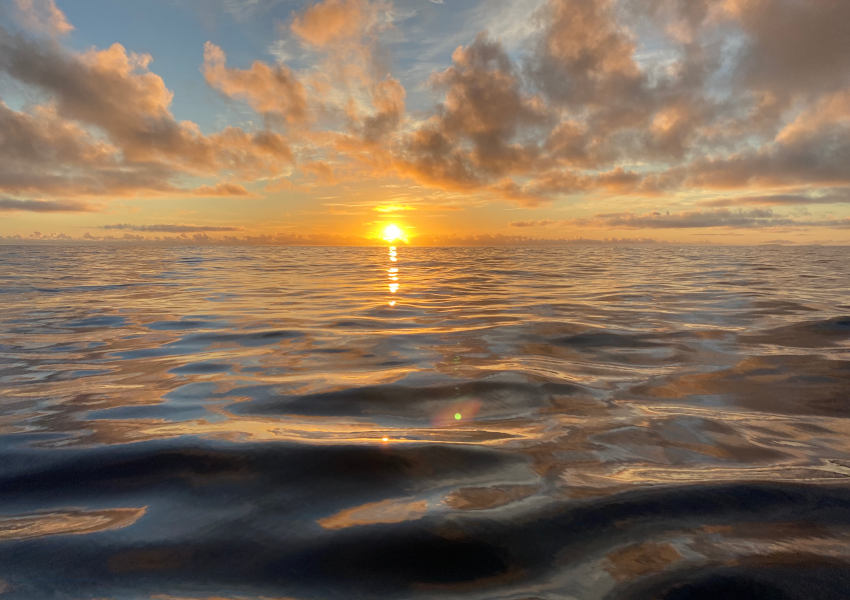 Mia captures the sunset from the rail of Miss Scarlet
Mia captures the sunset from the rail of Miss Scarlet
“Sailing and racing is continuing here; I am lucky to be in Auckland,” she says. “Everything is happening here with the America’s Cup. I am in the heart of it all.”
However, as she comes up on her second anniversary in the antipodes, Mia can’t help missing the connection with her loved ones back home.
“I left Ireland November 5th, 2018. It’s coming up to my two-year mark after leaving home,” she tells us.
“I’m dying to see my family as I didn’t get home the first year because I was racing so much and this year, well, if I left New Zealand I wouldn’t be getting back anytime soon.”
Afloat looks forward to further updates from Mia as she continues her sailing exploits in New Zealand.
Royal Irish YC Cadet Representing Dublin Club In New Zealand Hails Recent Sydney Match Racing Events
Royal Irish Yacht Club cadet member Niall Malone has sent the club an update of his recent competitions in New Zealand, where he currently lives and races.
First up was two weeks of racing in Sydney, Australia last month — at the Harken International Youth Match Racing Championships hosted by the Royal Prince Alfred from 18-22 November, and the Musto Youth Match Racing Internationals at the Cruising Yacht Club of Australia from 26-29 November.
“We had a good two weeks racing in a very close fleet in Sydney,” Niall says, hailing the “extremely high level of sailors” at both events.
Musto was his team’s first ever Grade 1 event, the helm says, so it was “a great opportunity just to be among such a good fleet and we were able to learn a lot”.
Despite neither event seeing him get the results hoped for, the young Irishman is proud that he “had some very close races, finishing less than half a boat length behind the world number two [New Zealand youth Nick Egnot-Johnson] and taking two wins of the Musto Youth International defending champion Frankie Dair”.
Next up for Niall will be the first ever New Zealand Foiling Match Racing Championships, being held at the Royal New Zealand Yacht Squadron from 13-17 January, in which he will be representing the RIYC.
Ireland Olympian Tony O'Connor to Coach New Zealand Men's Eight
#Rowing: New Zealand have chosen Tony O’Connor to coach their senior men’s eight. The 49-year-old former oarsman has been a successful coach at junior level, with the school at which he teaches, Christ’s College, Christchurch, and in the international set-up. He coached the New Zealand junior four which took silver at the World Junior Championships in 2017.
O’Connor represented Ireland at two Olympic Games (1996 and 2000), and was part of the lightweight four which finished fourth in 1996. He won gold in the lightweight pair in 2001 World Championships with Gearóid Towey. He partnered Neville Maxwell in the lightweight pair which set the world’s best time in 1994.
Award Follows Paul O'Donovan's Premier Achievement
#Rower of the Month: The Afloat Rower of the Month for February is Paul O’Donovan. The Skibbereen quartet of Mark O’Donovan, Shane O’Driscoll, Paul O’Donovan and Gary O’Donovan warmed slowly to their task in competing in the New Zealand Rowing Championships. The arrival of coach Dominic Casey helped. When finals came around, they won a bronze medal as a four. But topping this achievement was that of Paul O’Donovan in the Premier Single Sculls. The lightweight world champion mixed it with two of the top heavyweights in the world: O’Donovan finished third, just a few boat lengths behind Robbie Manson, who in 2017 set the world’s fastest time, and ahead of Olympic champion Mahe Drysdale.
The achievement makes Paul O’Donovan the Afloat Rower of the Month.
Rower of the Month awards: The judging panel is made up of Liam Gorman, rowing correspondent of The Irish Times and David O'Brien, Editor of Afloat magazine. Monthly awards for achievements during the year will appear on afloat.ie. Keep a monthly eye on progress and watch our 2018 champions list grow.
https://www.facebook.com/WorldRowing/videos/10160199271930651/
Skibbereen Four Take Premier Medal at New Zealand Championships
#Rowing: An Irish crew have taken a medal in the Premier grade at the New Zealand Rowing Championships. The Skibberen four of Gary O’Donovan, Paul O’Donovan, Mark O’Donovan and Shane O’Driscoll finished third in the Premier four, just a second ahead of fourth.
New Zealand Rowing Championships, Lake Karapiro, Day Five (Irish interest)
Men
Four – Premier
A Final: 3 Skibbereen (G O’Donovan, P O’Donovan, M O’Donovan, S O’Driscoll) 5:58.82.



























